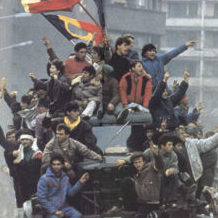We’re using this post to publicize a couple of CRSN-related UK-based events coming up in the next few months.
Marking the publication of their special issue of Classical Receptions Journal on the legacy of Greek political thought, in a recent post for the OUP blog entitled The legacy of ancient Greek politics, from Antigone to Xenophon CRSN members Barbara Goff and Miriam Leonard remind us that “the political thought of ancient Greece was not itself monolithic”. They ask:
What do the pamphlets of the English Civil War, imperial theorists of the eighteenth century, Nazi schoolteachers, and a left-wing American artist have in common? Correct! They all see themselves as in dialogue with classical antiquity, drawing on the political thought of ancient Greek writers. Nor are they alone in this; the idea that Western thought is a series of “footnotes to Plato,” as Alfred Whitehead suggested in 1929, is a memorable formulation of the extensive role of ancient Greece within modernity. Further reflection, however, will show that the West does not have an unbroken connection with ancient Greece, as knowledge of both language and culture declined in the medieval period – even the great Renaissance scholars sometimes struggled to master their ancient Greek grammar and syntax. Once the West does recover a relationship to ancient Greece, is its own role confined to writing “footnotes” under the transcendent authority of Plato? Perhaps we can reconstruct more varied forms of intellectual engagement.
Barbara is running our one-day CRSN workshop on ‘Revolutions and Classics’ on 22 July 2016, so if you’re interested in how classical texts can be used in societies going through radical social change do consider signing up (it’s free to attend)!
Meanwhile another CRSN member, Tony Keen, has been blogging about teaching ancient myth through cinema: not just showing film versions of myths, but using film to explore how myths work. In reflecting on ancient audiences and myth, Tony looks at how modern audiences cope perfectly well with different screen versions of Superman or of James Bond, and explores the relationships between fiction and ‘what really happened’. At the end of his blog post, Tony invites readers to share how they use cinema in their teaching.
If it’s reception of myth which interests you, there’s another one-day event, Remaking ancient Greek and Roman myths in the twenty-first century, being organised by another member of both CRSN and The Open University, Emma Bridges – that’s happening on 7 July and the programme is being finalized right now. One of Emma’s questions is: ‘Whilst myth is by its nature pliable, are there any limits to the flexibility which creative practitioners have in adapting the ancient tales for a twenty-first century audience?’

